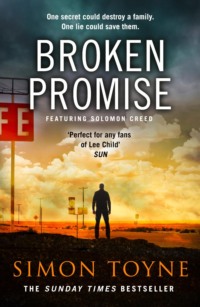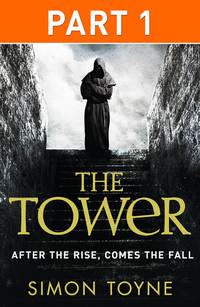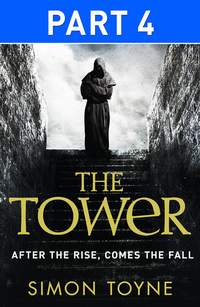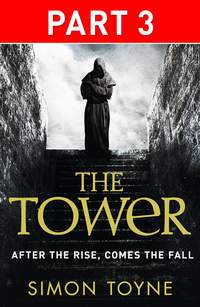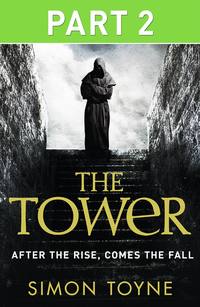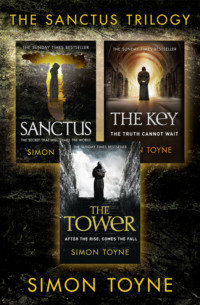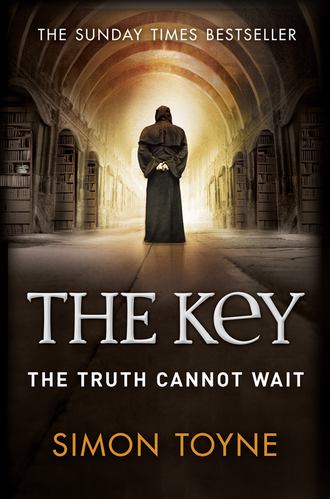
Полная версия
The Key
He rounded another corner and saw the truck parked in the shade of a row of buildings, the red company logo on the door the only splash of colour in the drab street. Tariq was in the driver’s seat, keeping guard to make sure no one stuck rocks up the exhaust pipe, or booby-trapped it in some way. Vehicles belonging to Western companies were always getting blown up or sabotaged.
Hyde waved to draw his attention. Tariq looked over and froze. Hyde spun away, sensing movement from his left, instinctively reaching for the automatic inside his jacket. He turned his head and found himself staring into a pair of pale grey eyes.
‘You forgot this,’ the Ghost said, draping the newspaper over Hyde’s extended gun. He stepped closer, ignoring the gun pressing into his chest. ‘These people,’ he tapped the photographs on the cover, ‘they may come here, searching for – something. If they come, let me know.’
Hyde glanced down and saw a satellite phone number scrawled beneath the three photographs. His lip curled into a sneer as he prepared to tell the Ghost where to go, but it was too late. He had already gone.
7
The Citadel, Ruin
The sound of the lament hit Athanasius like a wave as he and the other heads stepped into the cathedral cave and made their way to the front. It was the one space in the Citadel big enough to house everyone, and here everyone now was, united in their grief.
At the back were the numerous grey cloaks, the unskilled monks yet to be assigned a guild, separated from the higher orders by a vivid red line of guards. The brown cloaks came next – the masons, carpenters and skilled technicians who maintained the fabric of the Citadel – so tired after the work of the past week that Athanasius could see them swaying where they stood. In front of them were the white-hooded Apothecaria, medical monks whose skills elevated them above all but the black cassocks – the spiritual guilds, priests and librarians who spent their lives in the darkness of the great library, hoarding the knowledge that had been gathered in the dark mountain since mankind first learned to write and remember.
The sound continued to pulse from the congregation as Athanasius took his place at the altar and turned to face them all. It was traditional when the Prelate, the head of the mountain order, was gathered to God that the Abbot would deliver the eulogy and assume the role of acting Prelate until an election confirmed him in the position or chose someone else. But there were two bodies lying in state below the T-shaped cross at the front of the cave: the Prelate on the left, and the Abbot on the right. For the first time in its measureless history the Citadel had no leader.
As the lament neared its conclusion, Athanasius stepped up to the pulpit carved from a stalagmite and looked over the heads of the gathered monks to the raised gallery where the Sancti – the green cloaks – usually stood, segregated from their brethren to ensure the great secrets they kept remained so. There should have been thirteen of them including the Abbot, but today the gallery was empty. In the absence of an Abbot, or a natural heir drawn from the ranks of the Sancti, it fell to the Abbot’s chamberlain to deliver the eulogy – it fell to Athanasius.
‘Brothers,’ he said, his voice sounding thin after the richness of the requiem, ‘this is a sad day for all of us. We are without a leader. But I can assure you this situation will very soon be rectified. I have consulted with the heads of each guild and we have agreed to hold elections for the office of both Prelate and Abbot immediately.’ A murmur rippled through the congregation at this news. ‘All candidates must declare themselves by Vespers tomorrow, with elections to follow two days later. Such haste has been agreed by mutual consent because of the need to re-establish order coupled with the lack of a natural heir.’
‘And why are we in this situation?’ a voice called from the middle of the congregation. ‘Who ordered the Sancti to be taken from the mountain?’
Athanasius looked towards the voice, trying to catch sight of the monk who had challenged him. ‘I did,’ he said.
‘On whose authority?’ Another voice, from further back in the massed ranks of grey cloaks.
‘I acted on the authority of my own conscience and a sense of compassion for my brother monks. The Sancti had been struck down by some sort of haemorrhagic fever; they needed urgent medical attention and the explosion had cracked the walls to provide a quick means of evacuation. Modern ambulances were waiting outside. I did not think to question this providence. I merely thanked God for it and acted quickly to save the lives of my brothers. Had the Sancti remained in the mountain, they would now be dead, of that I feel sure.’
‘And what has become of them?’ A different voice now. Athanasius paused, fearful that the whole congregation was massing against him. Since assuming caretaker responsibilities, he had been privy to the Abbot’s usual digests and communiqués from the outside world. By this method he had learned the fate of the monks he had sought to save.
‘All have died – save two.’
Another murmur rippled through the crowd.
‘Then we should await their return,’ Brother Axel called out. The noise became a rumble of approval amid a general nodding of heads.
‘I fear that is unlikely,’ Athanasius replied, addressing the congregation rather than his challenger. ‘The last remaining Sancti suffered the same affliction as the others and their condition is grave. We cannot rely on them returning or having the strength to lead if they do. We must look to new leadership. The elections are set.’
A new disturbance broke out and everyone turned towards it. A figure had entered the door at the back of the cave and was now moving steadily towards the altar, his approach accompanied by the hum of voices and a strange, dry hissing sound. It was Brother Gardener, his name earned from many years of service in the pastures and orchards that flourished at the heart of the mountain.
The dry whispering grew louder with each step and so did the murmur of voices until Brother Gardener reached the altar and grimly stepped aside to reveal the source of the noise. It was the branch of a tree, broken off at the thickest part, its leaves and blossom brown and withered.
‘I found it in the orchard under one of the oldest trees,’ Brother Gardener said, his voice low and troubled. ‘It’s rotted right through.’
He looked up at Athanasius. ‘And there’re others, lots of others; mostly the older ones but some of the younger ones too. I’ve never seen anything like it. Something’s happening. Something terrible. I think the garden is dying.’
8
Vatican City, Rome
Clementi emerged from the lift into the softly lit vault and headed to the same boardroom where the Group had last met. Everyone had been best of friends then. All the trickier elements of the plan had been carried out and the recovery team had been deployed in the field ready to find and deliver the great treasure Clementi had promised – but that was before the explosion in Ruin.
Clementi turned to Schneider. ‘Make sure no one else comes down here until our meeting is concluded,’ he said, then heaved against the heavy door and passed into the boardroom.
They were all present, as Schneider had warned him, the Holy Trinity of conspirators – one American, one British and one Chinese.
In a world obsessed with money and power their faces were instantly recognizable. At one time or another each had graced the cover of Fortune magazine as revered owners of some of the biggest companies in the world, modern-day empires whose assets and influence crossed international borders and set the political agenda in their own and other countries. In previous ages they would have been emperors or kings and worshipped as gods, such was the extent of their power. They had also collectively lent the Church six billion dollars, through private accounts managed personally by Clementi, to underwrite their joint venture and prevent the Church from collapsing beneath its colossal debt. But they had not been persuaded to do this out of a sense of duty or a love of God, it was purely for the potentially huge financial gains Clementi’s proposition had promised, and, as in all such ventures, there came a time when dividends were expected – and that time was now.
‘Gentlemen,’ Clementi said, settling into a seat across the table from them, ‘what an unexpected honour.’
No one replied. Clementi felt the skin tighten on his scalp, like a nervous candidate at a job interview. Reminding himself that he had invited them into his scheme, not the other way round, he tried to calm himself by reaching for a cigarette and lighting up. Xiang, the Chinese industrialist, was already smoking, the smoke from his cigarette making all three of them appear like they were smouldering. Despite their differences in age and nationality, each man carried the same dense gravity of absolute power and authority. At eighty-three, Xiang was the oldest; his suit, hair and skin as grey as the ash that dripped from his cigarette. Lord Maybury, the English media baron, was ten years younger, with unnaturally dark hair hinting at a degree of vanity and fear of getting old, and the sort of slightly shabby suit only centuries of good breeding could get away with. Pentangeli was the youngest at sixty-two. He was a third generation Italian-American who, despite the bespoke Armani suit and grooming, still carried a certain menace about him, something he had inherited from the grandfather who had arrived penniless from Calabria and fought his way to a fortune in the land of the free. Pentangeli was the only one of the Group who was a practising Catholic and, as usual, it was he who acted as their initial spokesperson.
‘Do we have a problem, Father?’ he asked, sliding a newspaper across the table. It was USA Today. On its cover were the familiar images of the Citadel and the three civilians, along with the question being whispered around the world:
DO THEY KNOW THE SECRETS OF THE CITADEL?
‘No,’ Clementi said, ‘there is no problem. It is unfortunate that this has happened now, but—’
‘Unfortunate!’ Maybury jumped in, his smooth privately schooled accent making every word sound condescending. ‘Since time immemorial the Citadel has guarded its secrets. Only now, when one of its biggest directly affects our joint investment, does it start to look leaky. I would call that rather more than unfortunate.’
‘No secrets have been revealed,’ Clementi said, keeping his voice low and calm. ‘This is merely the result of a few misguided terrorists making a token attack on the Church. I can assure you, from the moment they were brought from the mountain, the survivors have been isolated and monitored. Ruin is a city that owes its very existence to the Church. We have far-reaching influence there. They are being held in an old secure psychiatric wing in the main city hospital. A priest and a police guard have been watching them round the clock to prevent the press or anyone else getting close. All police interviews, all consultations with lawyers, all medical discussions with the patients have been recorded and passed to me. I can assure you that not one of them has shown any indication that they learned anything compromising to us during their time inside the Citadel.’
‘Not yet,’ Pentangeli said, flipping open his briefcase to retrieve a document with CIA stamped across the cover. ‘You’re not the only one with friends in high places.’ He slid it across the table for Clementi to read.
It was the transcript of a confidential interview between a patient known as Liv Adamsen and a Dr Yusef Kaya, chief clinical psychiatrist at Davlat Hastenesi Hospital, Ruin. The final paragraph had been outlined in yellow highlighter.
… The patient displays classic symptoms of post-traumatic amnesia, possibly caused by a severe physical or psychological trauma. However, the patient is strong physically and her mind is otherwise lucid and unimpaired, so with time and therapy she should be able to fully recover her lost memories and return to continuous recall.
‘She’s a ticking time bomb,’ Xiang said, in precise, smoke-tinged English. ‘For myself I do not care whether this Sacrament is revealed to the world or not. Frankly, I think it is a myth – I am an atheist, as you know. What does concern me is that, if the Citadel cannot keep this, its biggest secret, might it prove unequal to the task of keeping ours?’
‘And she’s not the only concern,’ Pentangeli added, pulling another document stamped CONFIDENTIAL from his case.
‘Subject one: Kathryn Mann, forty-eight years old, half-Brazilian, half-Turkish, head of a global humanitarian aid charity with offices all over the world, including Ruin. Widow of Dr John Mann, US-born archaeologist and scholar, killed twelve years ago on a dig in Iraq along with the rest of his team after they reportedly discovered something in the desert around the location of Al-Hillah.’ He looked up at Clementi. ‘And you’re not worried about that?’
Clementi said nothing.
‘Subject two: Gabriel Mann, thirty-two, son of Kathryn and John Mann. Studied modern languages and economics at Harvard until his father was murdered, whereupon he joined the army. He rose to the rank of platoon sergeant in Special Airborne, saw combat in Afghanistan and was decorated twice before mustering out and joining the family firm working as a security advisor. In this capacity he worked on a number of projects in Iraq where he conducted his own investigation into his father’s death. Three times he requested travel permits to Al-Hillah in Babil Province, and each time he was rejected because of ongoing insurgent activity and the perceived danger to civilian life.’ He looked over the document at Clementi. ‘Sounds like a man with unfinished business to me. Unfortunately, it’s in an area where we also have some business interests. And that makes us very nervous.’
‘We are all in agreement,’ Xiang said. ‘The risks these people pose is unacceptable to us. We have limited influence in Ruin, but, as you yourself said, through the Church you have plenty. We urge you to use it and use it quickly to protect your interests – and ours.’
Clementi held their collective gaze. An hour ago he might have hesitated, but standing in the file rooms of the Vatican Bank had reminded him of all he stood to lose. The survival of the Church was more important than anything, more important than his own soul. And if he burned in hell for what he was about to do, then it would be a sacrifice worth making. He reached forward and pressed a button on the desk phone in the centre of the table. Like everything in the room, the phone-line was as secure as most countries’ national security network. It could not be traced and it could not be tapped.
He quickly dialled a number from memory, his fingers shaking from the adrenalin flooding his system. He left it on speakerphone so everyone in the room could hear the conversation he was about to have. He wanted them to witness it. He wanted them to be part of it. He studied their faces as the rapid beeps of the number turned into a ringing tone; then a click cut it off and a voice answered.
‘Yes?’
‘I am the light of the world,’ Clementi said, ‘whoever follows me—’
‘—will never walk in darkness,’ the voice answered, completing the security check.
Clementi licked his dry lower lip with a tongue that was even drier. ‘I want you to silence the witnesses, for the sake of the Church.’
There was a pause. ‘All of them?’
‘All of them; how soon can this be accomplished?’
In the background Clementi heard the squeak of rubber shoes on a vinyl floor. ‘It will be done by morning,’ the voice said. Then the phone went dead.
9
Room 406, Davlat Hastenesi Hospital
Liv grabbed a bulky remote-control unit from the table by her bed and fired it at the ancient-looking TV. She had been lying on her bed for long minutes, breathing slowly, hoping that her memory might return, when a single solid fact had surfaced: when she’d arrived in Ruin, however many days ago, her brother’s death had been a big story. Maybe it still was; perhaps the news could plug some of the gaps she was having difficulty filling herself.
The set crackled and the sound faded up. Liv nudged the volume down so as not to alert the watchers in the corridor. The TV was old and the picture fuzzy, but whatever was feeding it a signal was modern enough and there were hundreds of channels available. Liv cycled steadily through them, searching for a news station. If she could just get a few solid facts to grab on to she felt sure she would be able to pull herself together. She continued through a parade of talk shows and daytime soaps until, finally, she found Al Jazeera, the Arabic news channel – but it wasn’t what she was expecting.
At first she thought the station ident was wrong and she must be watching an extreme weather show. Horrific images of a tidal wave in Chile sweeping down a main street carrying people, cars and houses with it segued into a story showing a tearful farmer in the grain belt of Kansas, staring out on a huge field of wheat that had been battered to mud by hailstones the size of oranges.
‘If you read your Bible,’ the farmer said in a voice that wobbled with emotion, ‘you might think Judgement Day was close at hand.’
A whispering static rose in Liv’s head at the mention of this, bringing a vague nausea with it. She closed her eyes and breathed in through her nose and out through her mouth until it ebbed away. Whatever drugs they had her on were having some alarming side effects.
When she opened her eyes she received a fresh shock. The image on the screen had changed, this time to the one that had graced the cover of every newspaper in the world when Liv had first arrived in Ruin. It showed her brother, Samuel, standing on the summit of the Citadel, arms outstretched, his monk’s cassock stretched taut, making the sign of the T-shaped cross with his body.
‘It has been twelve days since the dramatic appearance of a monk on top of the Citadel in Ruin, and ten days since the explosion tore a hole in the base of it—’
Twelve days!
‘Many believe these events in Ruin are in some way connected to the worldwide weather phenomena we have witnessed since, with various religious groups citing them as evidence of God’s anger or signs of the oncoming apocalypse predicted in the Book of Revelation. They also suggest the deaths of the evacuated monks is God gathering his own, and just a few minutes ago, this death toll increased once again.’
The picture cut to a jostling image of a large bald man wearing a black moustache and a serious expression. A caption identified him as Dr Jemya, Chief Medical Registrar of Davlat Hastenesi Hospital, Ruin. He started to read the prepared statement and the sound dipped, translating the Turkish into English.
‘Regretfully I am to announce to you, that at one twenty-five p.m. local time, another of the persons removed from the Citadel lost their life. This brings the death toll to nine.’
The press pack boiled into rowdy life and started pelting him with questions.
What was the cause of death, was it the same haemorrhaging as the others?
‘Yes.’
Do you know what’s causing it?
‘We’re working on it.’
Is it a virus?
‘No.’
Is it contagious?
He didn’t answer, he just turned and ran up the steps to the sanctuary of the hospital.
‘Thirteen people came out of the mountain. Now only four remain.’
The picture changed and Liv stared at her own photograph sandwiched between one of a dark-haired woman she vaguely remembered and another of a green-robed monk lying on a stretcher, blood streaming from uniform cuts all over his body.
‘Of these, three are still in hospital, their condition said to range from comfortable to critical.’
Shaky news footage showed a dark-haired man being manhandled into the back of a police car.
‘The fourth remains in police custody, where he is being held for questioning.’
The picture froze and Liv’s heart rolled over as she recognized his face and a name surfaced in her mind.
Gabriel.
Seeing him brought a cascade of feelings and memories.
She remembered him smiling down to her in the darkness of the Citadel, and his arms holding her in the ER after he had brought her out, protecting her until the cops had come to take him away. He had cradled her face in his hands and held her eyes with his.
If you get the chance, then go, he had said, as far from the Citadel as you can. Keep yourself safe – until I find you.
Then he had kissed her, full on the lips, until they’d pulled him away, leaving her alone in the screaming chaos of the hospital.
She touched her lips, remembering the kiss, wishing she could remember more. She had to get out of here, Gabriel’s warning and her own instincts told her that. She needed to go somewhere safe to try to piece together the fragments of what had happened in the darkness of the mountain, far away from the dark influence of this place and the meds that were making her mind fuzzy. She needed to go home, she felt it with the sharpened instinct of the hunted.
Then, as if something had sniffed her fear and been drawn to it, she heard the squeak of a shoe on the vinyl floor outside. She stabbed the remote to silence the TV and, just as she settled back in her bed – the door began to open.
10
The Citadel, Ruin
The rain lashed the mountain as Brother Gardener led the small delegation outside into the walled garden at the heart of the Citadel. It had been agreed that the heads and acting heads of the main guilds were the only people permitted to enter, until the condition of the trees had been properly assessed.
‘There,’ Brother Gardener said, pointing at the uppermost branches of an apple tree. ‘See the discoloration in the leaves.’
Even Athanasius, who knew little about nature, could see the tree looked wrong. It appeared to be readying itself for autumn rather than bursting with the vigour of spring.
‘When did you first notice this?’ Axel asked, his policeman’s demeanour sliding through the nasal drone of his question.
‘Just yesterday. But I haven’t been spending much time in the garden, what with all the clear-up work inside the mountain.’
‘And before that there was no evidence of this … blight?’
‘No.’
‘So all this has come about since the explosion?’
‘I suppose it has, yes.’
Father Malachi turned to face Athanasius. ‘You see?’ he said. ‘You should never have allowed the Sancti to set foot outside the mountain. Something sacred has been upset by your actions. This is a clear manifestation of it.’
Athanasius stepped past to inspect the withering sections of the tree. ‘Have you ever encountered anything like this before?’
Brother Gardener shrugged. ‘From time to time.’
‘And what were the causes then?’
‘All kinds of things cause blight – drought, insect infestation, disease.’
‘Might something like an earthquake cause it?’
‘It might. If the ground shifts sufficiently, then roots get broken and the tree starves.’
‘And would we all not agree that the shock of the explosion travelling through the mountain was similar to the effects of an earthquake?’ He turned to Malachi. ‘I realize we are all under tremendous strain because of what has happened here, but now is not the time for superstition and panic. Now is the time for clear heads and calm leadership.’ He turned back to Brother Gardener. ‘What would you suggest as the best course of action?’
The big man stroked his beard and surveyed the trees. ‘Well, if it is as you say, then it won’t get any worse. We can cut away the bits that are dead and dying to speed the trees’ recovery. But if it is something else,’ he cast a furtive glance towards Malachi, ‘then it will spread.’


